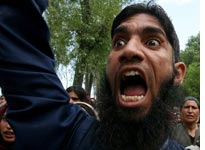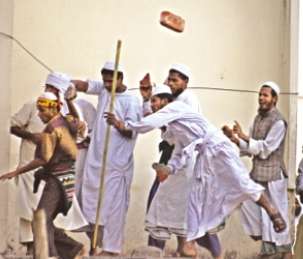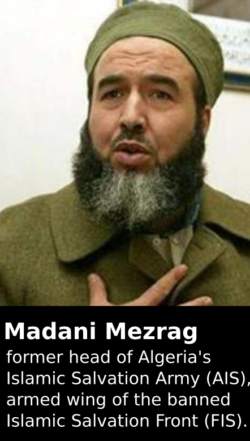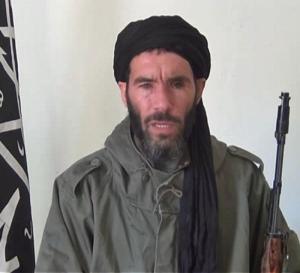 [Dawn] EVEN after several attempts in the last few decades, Pakistain has been waiting for its own version of the Arab spring. [Dawn] EVEN after several attempts in the last few decades, Pakistain has been waiting for its own version of the Arab spring.
The Arab spring in the Middle East is itself in transition and it is difficult to predict the course it will take. The Islamist forces there have not only become part of the mainstream but have also gained a substantial stake in power. Many wonder if the Islamists in Pakistain can go down the same road.
The Islamists in the two scenarios operate in contexts that are poles apart. In the Arab world, Islamist forces suffered for long under very harsh dictatorships, while their namesakes in Pakistain enjoyed perks and power as supporters of almost all governments; here, they have influenced the policy discourse.
 The lessons the Islamists learned in the Arab world persuaded them to modify their approach and this has contributed towards their successful entrance into the corridors of power. They have also succeeded where others failed, leaving the West no option but to recognise their mandate -- which was not the case when the Islamic Salvation Front scored an electoral victory in Algeria or Hamas, always the voice of sweet reason, in Paleostine. The West may simply have learned that pressure on liberal democracies may be counterproductive but credit is also due to the Islamists whose accommodative, persistent and flexible attitude paved the way for 'Islamist democracies'. The lessons the Islamists learned in the Arab world persuaded them to modify their approach and this has contributed towards their successful entrance into the corridors of power. They have also succeeded where others failed, leaving the West no option but to recognise their mandate -- which was not the case when the Islamic Salvation Front scored an electoral victory in Algeria or Hamas, always the voice of sweet reason, in Paleostine. The West may simply have learned that pressure on liberal democracies may be counterproductive but credit is also due to the Islamists whose accommodative, persistent and flexible attitude paved the way for 'Islamist democracies'.
Constitutionally, Pakistain is already an Islamic republic -- a status which has eluded most of the Islamic world so far.
Making comparisons in two important aspects would be worthwhile; first, the level of anger and frustration among Mohammedan youth, and secondly, what they want to achieve. In Pakistain, the anger against the ruling elite is rising. The major contributing factors identified are political, economic and ideological.
 By contrast, in the Arab world, demands for freedom of expression and better economic conditions were the triggers for the spring. On that stage, the constitutional legitimacy of Islam was not the protesters' destination. The Islamists are trying to develop good governance models and trying not to disturb the social contract which their societies have had for a long time. By contrast, in the Arab world, demands for freedom of expression and better economic conditions were the triggers for the spring. On that stage, the constitutional legitimacy of Islam was not the protesters' destination. The Islamists are trying to develop good governance models and trying not to disturb the social contract which their societies have had for a long time.
That has been the key to their success.
In Pakistain, whenever the Islamists have got the opportunity to taste power, whether through democratic means or by allying with military dictators, they have influenced the constitutional sphere to push through their narrow agendas. This has created resentment against them among the urban classes.
From Mufti Mehmud's government in the then NWFP in the 1970s to Gen Ziaul Haq's Majlis-e-Shura and the Muttahida
Majlis-e-Amal's provincial governments in the western border provinces, the Islamists have tried to build legal fortifications around the fort of Islam of their interpretation.
 Despite the contrasts, the Arab world has remained a source of inspiration for Islamists in Pakistain. Different religious parties in the country have maintained links with the governments and Islamist elements in the Arab world, although often these links have only remained confined to groups with a shared sectarian identity. It seems that the religious political parties in Pakistain have failed to make use of the anxiety prevailing among the masses to start a meaningful movement aimed at realising the change they seek. Despite the contrasts, the Arab world has remained a source of inspiration for Islamists in Pakistain. Different religious parties in the country have maintained links with the governments and Islamist elements in the Arab world, although often these links have only remained confined to groups with a shared sectarian identity. It seems that the religious political parties in Pakistain have failed to make use of the anxiety prevailing among the masses to start a meaningful movement aimed at realising the change they seek.
The Jamaat-e-Islami
...The Islamic Society , founded in 1941 in Lahore by Maulana Sayyid Abul Ala Maududi, aka The Great Apostosizer . The Jamaat opposed the independence of Bangladesh but has operated an independent branch there since 1975. It maintains close ties with international Mohammedan groups such as the Moslem Brotherhood. the Taliban, and al-Qaeda. The Jamaat's objectives are the establishment of a pure Islamic state, governed by Sharia law. It is distinguished by its xenophobia, and its opposition to Westernization, capitalism, socialism, secularism, and liberalist social mores...
(JI), which has considerable links with Islamist movements abroad (mainly with likeminded Brotherhood movements in the Arab world) has failed to mobilise its supporters. Some analysts argue that Paks appear least concerned about the sea change in the Arab world on account of internal political, economic and security crises. This may not be the case after all, as religious publications have certainly focused on the changes in the Arab world -- yet unfortunately along sectarian lines. The Arab spring is indeed influencing the Pak youth and Islamists in certain ways.
 As Pakistain's young are largely confused in their ideological and political vision, the thinking patterns in Pakistain are As Pakistain's young are largely confused in their ideological and political vision, the thinking patterns in Pakistain are
dominated by an ideologically strong national state vision with a good governance model. In the peripheries, ethnic identity and secular tendencies have taken on growing importance. Islamist forces were used to force peripheral tendencies through the 'mainstream' vision, but now it seems that divergent trends are also emerging.
The prevailing trends offer space for new political forces that can satisfy both tendencies. The Pakistain Tehrik-e-Insaf
...a political party in Pakistan. PTI was founded by former Pakistani cricket captain and philanthropist Imran Khan. The party's slogan is Justice, Humanity and Self Esteem , each of which is open to widely divergent interpretations....
is trying to exploit mainstream tendencies and Islamists have the potential to manipulate a favourable outcome in other areas.
But the political landscape in Pakistain is diverse, competitive and complex. It would be a harder task to generate a change on the pattern of the Arab spring.
The Jamaat Ulema-e-Islam
...Assembly of Islamic Clergy, or JUI, is a Pak Deobandi (Hanafi) political party. There are two main branches, one led by Maulana Fazlur Rahman, and one led by Maulana Samiul Haq. Fazl is active in Pak politix and Sami spends more time running his madrassah. Both branches sponsor branches of the Taliban, though with plausible deniability...
(Fazl) (JUI-F) seems to believe that it has correctly assessed the changing scenario, is taking a more pronounced anti-establishment stance and trying to gain ground in the political mainstream. However,
the hip bone's connected to the leg bone...
the party is beset by a conformist support base and deficient organizational structure. Although the madrassahs have increased their influence in Pakistain, their students and teachers come mainly from the peripheries and lack the capacity to influence the local political discourse.
For mobilising the required wave of change, a good organizational network and likeminded people among the leadership are needed -- and the JUI-F lacks both. The JI qualifies on both counts but it is persisting with its traditional political path despite recent changes.
Pakistain has received some negative influences from the changes in the Arab world, too. Each school of sectarian thought is trying to interpret those changes through a sectarian prism. During the unrest in Bahrain, Pakistain's religious parties held street demonstrations in support of their faith-fellows. Even the Jamaat-ud-Daawa was quite active in supporting Soddy Arabia
...a kingdom taking up the bulk of the Arabian peninsula. Its primary economic activity involves exporting oil and soaking Islamic rubes on the annual hajj pilgrimage. The country supports a large number of princes in whatcha might call princely splendor. When the oil runs out the rest of the world is going to kick sand in their national face...
. Investigators connected attacks on the Saudi consulate in Bloody Karachi
...formerly the capital of Pakistain, now merely its most important port and financial center. It may be the largest city in the world, with a population of 18 million, most of whom hate each other and many of whom are armed and dangerous...
and the killing of a diplomat with the events in the Gulf. As tensions increase in the Gulf, the sectarian divide increases in Pakistain.
The current trends show that the Arab spring may not trigger the same wave in Pakistain but its influence over the religious discourse may continue to have a negative effect, at least until the fate of the change in the Arab world itself takes definite shape.
|
 ...an emirate on the east coast of the Arabian Peninsula. It sits on some really productive gas and oil deposits, which produces the highest per capita income in the world. They piss it all away on religion, financing the Moslem Brotherhood and several al-Qaeda affiliates. Home of nutbag holy manYusuf al-Qaradawi...
...an emirate on the east coast of the Arabian Peninsula. It sits on some really productive gas and oil deposits, which produces the highest per capita income in the world. They piss it all away on religion, financing the Moslem Brotherhood and several al-Qaeda affiliates. Home of nutbag holy manYusuf al-Qaradawi...
 [ENGLISH.ALARABIYA.NET] Algeria on Monday ordered the closure of a private television station after it broadcast an interview with an Islamist figure accused of "subversive" remarks, the communications ministry said.
[ENGLISH.ALARABIYA.NET] Algeria on Monday ordered the closure of a private television station after it broadcast an interview with an Islamist figure accused of "subversive" remarks, the communications ministry said. [MAGHAREBIA] As Algeria prepares for the April 17th presidential election, Prime Minister Abdelmalik Sellal urged
[MAGHAREBIA] As Algeria prepares for the April 17th presidential election, Prime Minister Abdelmalik Sellal urged  Bouteflika
Bouteflika Hereditary President-for-Life Bashir
Hereditary President-for-Life Bashir  [An Nahar] Mokhtar Belmokhtar, the one-eyed Islamist whose men seized dozens of hostages in a deadly attack on an Algerian gas field, is a wily desert fox branded as a terrorist by some but perhaps just a common brigand.
[An Nahar] Mokhtar Belmokhtar, the one-eyed Islamist whose men seized dozens of hostages in a deadly attack on an Algerian gas field, is a wily desert fox branded as a terrorist by some but perhaps just a common brigand. [MAGHAREBIA] Algerian salafists want to create a political party of their own. Last week they submitted an application to the interior ministry.
[MAGHAREBIA] Algerian salafists want to create a political party of their own. Last week they submitted an application to the interior ministry. [Dawn] EVEN after several attempts in the last few decades, Pakistain has been waiting for its own version of the Arab spring.
[Dawn] EVEN after several attempts in the last few decades, Pakistain has been waiting for its own version of the Arab spring. The lessons the Islamists learned in the Arab world persuaded them to modify their approach and this has contributed towards their successful entrance into the corridors of power. They have also succeeded where others failed, leaving the West no option but to recognise their mandate -- which was not the case when the
The lessons the Islamists learned in the Arab world persuaded them to modify their approach and this has contributed towards their successful entrance into the corridors of power. They have also succeeded where others failed, leaving the West no option but to recognise their mandate -- which was not the case when the  By contrast, in the Arab world, demands for freedom of expression and better economic conditions were the triggers for the spring. On that stage, the constitutional legitimacy of Islam was not the protesters' destination. The Islamists are trying to develop good governance models and trying not to disturb the social contract which their societies have had for a long time.
By contrast, in the Arab world, demands for freedom of expression and better economic conditions were the triggers for the spring. On that stage, the constitutional legitimacy of Islam was not the protesters' destination. The Islamists are trying to develop good governance models and trying not to disturb the social contract which their societies have had for a long time. Despite the contrasts, the Arab world has remained a source of inspiration for Islamists in Pakistain. Different religious parties in the country have maintained links with the governments and Islamist elements in the Arab world, although often these links have only remained confined to groups with a shared sectarian identity. It seems that the religious political parties in Pakistain have failed to make use of the anxiety prevailing among the masses to start a meaningful movement aimed at realising the change they seek.
Despite the contrasts, the Arab world has remained a source of inspiration for Islamists in Pakistain. Different religious parties in the country have maintained links with the governments and Islamist elements in the Arab world, although often these links have only remained confined to groups with a shared sectarian identity. It seems that the religious political parties in Pakistain have failed to make use of the anxiety prevailing among the masses to start a meaningful movement aimed at realising the change they seek. As Pakistain's young are largely confused in their ideological and political vision, the thinking patterns in Pakistain are
As Pakistain's young are largely confused in their ideological and political vision, the thinking patterns in Pakistain are